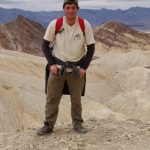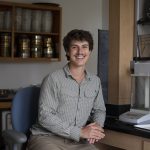
- This event has passed.
Interdisciplinary Seminar: Scott Booth & Josh Himmelstein
November 8, 2021 @ 12:20 pm - 1:20 pm
The UNC at Chapel Hill Department of Earth, Marine, and Environmental Sciences presents the interdisciplinary seminars of graduate students Scott Booth & Josh Himmelstein. This event will be held on Monday, November 8th at 12:20 pm. This seminar will be held both in person and will be available online. The physical locations will be Room G201 on the ground floor of Murray Hall on UNC at Chapel Hill campus, and at the coast in Room 222 at the Institute of Marine Sciences in Moorehead City, NC. To view the event online join via Zoom Meeting ID 935 3703 8099.
 Scott Booth Interdisciplinary Seminar
Scott Booth Interdisciplinary Seminar
Title: Seagrass Geoengineering and Potential Issues with the Verified Carbon Standard (Booth)
Abstract: As anthropogenic carbon production continues to rise, the search for methods to sequester carbon has grown considerably. One candidate that has risen to prominence in recent years is blue carbon – or carbon sequestered by vegetated coastal environments – which appears to have an outsized ability to capture and bury organic carbon. Following marshes and mangroves, seagrass environments are the third most significant carbon-burying blue carbon environment. Because of their potential as sequestering environments and value as a coastal ecosystem, many seagrass geoengineering projects have been undertaken to rebuild and restore seagrass meadows that have been destroyed or diminished by storms, climate change, or other means. The international community has sought to incentivize projects like these by introducing carbon credits to create independent funding mechanisms that can significantly mitigate the overall cost. However, there have been notable issues raised with the methodology used by credit-granting organizations like the Verified Carbon Standard (VCS, or Verra). A lack of nuance in the quantification of carbon sequestration has led some to believe the VCS and other standards both overestimate general global blue carbon sequestration potential, and fail to account for post-burial processes thereby systematically over-crediting blue carbon project.
 Josh Himmelstein Interdisciplinary Seminar
Josh Himmelstein Interdisciplinary Seminar
Title: Seagrass Geoengineering and Potential Issues with the Verified Carbon Standard (Booth) & Effects of Floating Solar Panel platforms on coastal primary productivity and hydrodynamics (Himmelstein)
Abstract: Global energy consumption is projected to double by 2050, but an increasing proportion of that wattage will be supplied by renewable means. Solar photovoltaic farms are becoming frequent sights on vast swaths of flatland. Recently, deployments atop freshwater bodies have demonstrated a greater efficiency of panels when compared with existing land-based operations. Few studies have considered the effect of floating photovoltaic panels in coastal settings, which are often closer to population centers but subject to tides and high currents. In this interdisciplinary presentation, I will discuss the platform-induced effects of light-deficits, wind-shielding, and surface friction on stratification and Net Primary Productivity (NPP). The General Ocean Turbulence Model and the Biogeochemical Flux Model are coupled and applied to three hydrodynamically distinct sites in the well-researched North Sea. After validating these models, vertical and seasonal trends in NPP and mixing depths are compared at varying surface coverage fractions. A reduction in photosynthetically active radiation paired with reduced solar heating results in lower depth-integrated phytoplankton stocks. Below 20% simulated coverage, the reductions in NPP are similar at each site and less than 10%. Higher coverage proportions result in non-linear responses that vary between well-mixed and stratified sites. These effects are largely applicable to floating solar farms on similar length scales to local tidal-excursion lengths, with further studies needed to explore three-dimensional flow at the boundaries of the platforms. Ideally, these studies will be completed prior to the broad-scale installation of floating solar panels in coastal settings.
